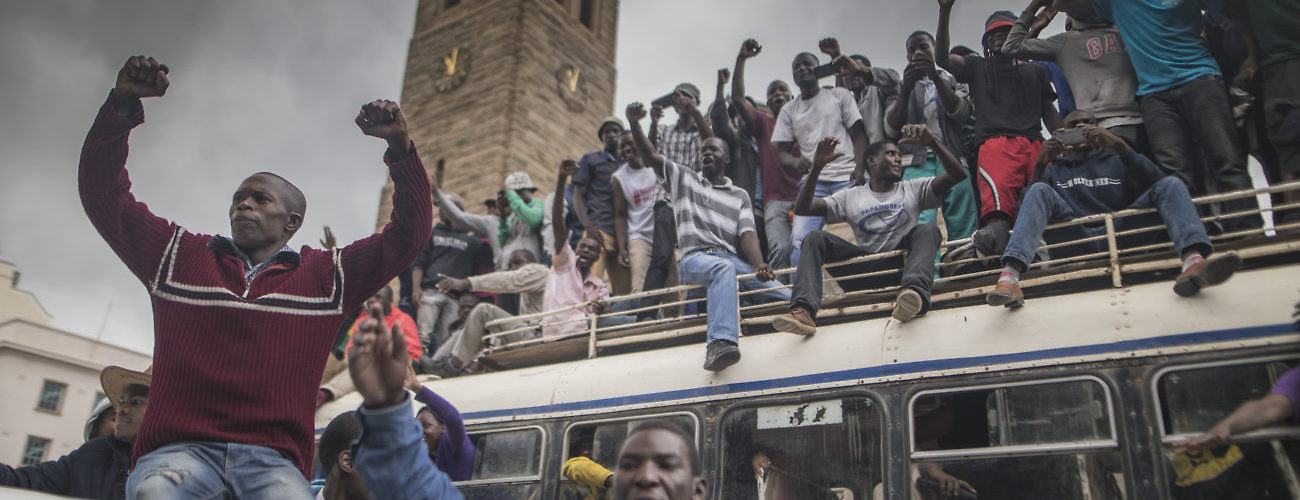People cheer a passing Zimbabwe Defense Force military vehicle during a demonstration demanding the resignation of Zimbabwe's president on November 18, 2017 in Harare. (Photo by Belal Khaled/NurPhoto/Sipa USA)
The events in Zimbabwe over the past few days have returned to the conversation an often disregarded stakeholder: the country’s citizens. On November 18, Zimbabweans—both within the country and in the diaspora—took to the streets en masse, with a palpable excitement and of their own accord, to take a public stance. They wanted to communicate to the international community, the African Union (AU), and the Southern African Development Community (SADC) that as a people they can no longer be compelled to accept the ruinous leadership of President Robert Mugabe.
Despite the clear position of the public, the political dimension of this story has a complicated and lengthy backstory. Recent developments intensified long-standing factionalism within the governing Zimbabwe African National Union-Patriotic Front (ZANU-PF) party in an uncontainable and public manner. What was originally an in-house political fight between the Generation40 and Team Lacoste factions—led by First Lady Grace Mugabe and former Vice President Emmerson Mnangagwa respectively—transformed into a national issue.
The dismissal of Mnangagwa on November 6 was a significant escalation. A former ally and loyalist of Mugabe, and a senior ZANU-PF official, Mnangagwa was accused of treason and witchcraft in a deliberate move to catapult Grace Mugabe into filling any future presidential vacancy. This move aimed to turn leadership in Zimbabwe into an heirloom passed down within the Mugabe family.
The army, for its part, has avoided communicating details on what exactly is occurring. Though they claim that their efforts have been to remove ‘criminal elements’ from within the party, the army endorsed and maintained Mugabe’s control through decades of on-going political infighting and corruption, allowing the socio-economic struggles that resulted to be experienced almost entirely by the people.
Ultimately, the army is aware that no matter how peaceful a military overthrow of a sitting president, the international community will likely disapprove of a military junta. The SADC has also apparently stated that they will not recognise any leader that takes the country in this unconstitutional manner. It is perhaps not surprising then to hear speculation that other countries, including China and the US, had prior knowledge of the army’s plans and gave tacit approval, thus providing support for General Constantino Chiwenga’s actions and for Mnangagwa himself.
How the next few weeks and months will pan out remains unclear. From what has happened thus far it can be gleaned that long-standing leadership issues in Zimbabwe persist. It is also clear that whatever the intention of the so-called ‘coup’ organizers, and whatever Zimbabwe’s path going forward, ordinary citizens are no longer willing to be bystanders. Zimbabweans have learned tough lessons about their country over the years—through their votes being discounted in the 2008 election, through being the casualties of former South African President Thabo Mbeki’s quiet diplomacy era, and through experiencing the might and terror of the army over decades, even in mundane day-to-day occurrences such as harassment at roadblocks. The people are desperate to see change and made a unanimous move to be heard.
The momentous turnout of civilians in the tens of thousands and their unified stance necessitated the ZANU-PF Central Committee to meet on the morning of November 19. The people had spoken. Within a few hours President Mugabe had been dismissed as the leader of the ZANU-PF and Grace Mugabe was fired from her position as the leader of the Women’s League. Mnangagwa replaced Robert Mugabe as the new party leader.
In spite of the public’s outcry, Zimbabwe’s way forward is once again being discussed behind closed doors and amongst officials. In these scenarios are several ideal and some not so ideal possibilities—resignations, impeachment through parliament and congress, a violent coup, the establishment of a transitional government, or a return to Mugabe’s leadership as usual. Whatever the transitional path, the reality—understood by most citizens—is that many of these leaders have blood on their hands as well as crimes of corruption to their names. They are also aware that it is the same old guard, a recycling of unchanging people who have existed in government in various forms. The people acknowledge that Mnangagwa’s return is for personal glory and power and that he has been held complicit in the Gukurahundi killings in the early 1980s. They also recognize that General Chiwenga was accused of corruption in Marange in relation to the diamond trade. Civilians thus question if a possible alternative leader exists who can do things differently, as it is evident that they are cut from the same cloth. Nonetheless, the fact that the majority of Zimbabweans have never known another leader was enough reason to gather and celebrate the prospects of Mugabe’s overthrow.
As it stands, the persistent common stance of the civilian is their realization that they too hold power and in fact have legislative and judicial authority to choose and depose of leaders. Academic and political analyst Alex Magaisa aptly highlighted several aspects of the constitution that provide the people with the power to give authority to who should govern them and how. He points to section 3(2)(f) which states to “respect the people of Zimbabwe, from whom authority to govern is derived” and section 28 that says executive authority “derives from the people of Zimbabwe.” If this civilian precedence continues and strengthens, leaders in the future may take better notice, and hopefully change their modus operandi for the furtherance of Zimbabwe and its peoples.
Nompilo Ndlovu is a development professional with experience in academia as well as the non-profit sector. Her research interests are in conflict, development, cultural memory studies, and social justice. She is currently a PhD candidate at the University of Cape Town where she studies and lectures in the Department of Historical Studies. She is an alumnus of both the African Leadership Centre and the Women’s Funding Network.





